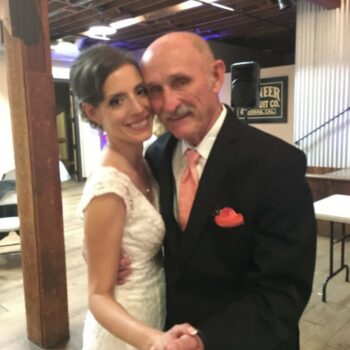Amy Jolley

Always offer support to the patient when he or she is in pain or doesn’t want to be alone. You may need to explain over and over why the patient is there and the reason he or she is in pain. Sometimes, just a gentle touch to the patient’s arm or sitting on the bed next to him or her is enough to offer reassurance.
December 29th, 2017
Amy Jolley’s father has Alzheimer’s disease, and she shares advice on how to make hospital stays easier for an Alzheimer’s patient.
My Dad, Dave, was diagnosed with mild cognitive impairment (MCI) 14 years ago at age 59. Soon after, the MCI progressed into Alzheimer’s disease. Before the disease, he was healthy, outgoing, social, charismatic and funny. He loved being outdoors with my sisters and I, and he was active in cycling, golf, camping and hiking. He continued to ride his bike until he got lost on a bike ride, and we had trouble locating him.
Since the diagnosis, his life changed, as it did for our family. We have watched a very warm and social person disappear into someone who is quiet, withdrawn and easily agitated. Once in awhile, he will smile or crack a joke, and in an instant, his old self returns. We celebrate these moments.
My Mom and Dad have been married for 50 years. They have been exceptional role models for all of us. They were affectionate, loved to dance and have always taken care of each other. I don’t believe my Mom was expecting to become a caregiver. Despite what she’s experienced through the years, she has done a great job caring for our Dad. Recently, she decided to place him in a care facility because she could no longer care for him and herself, even with our help.
As a family, we’ve encountered many challenges that come with loving and caring for someone with Alzheimer’s. One of our greatest challenges has been when he’s needed to be hospitalized. In each case of hospitalization, he declined faster in the disease, and it took longer for him to bounce back into a routine. This year, he was hospitalized for diverticulitis and underwent major surgery. Every minute was a challenge, from the ambulance ride to him being admitted to the hospital, going into surgery, coming out and eventually, being released. He was brought home to recover; it was a daunting and exhausting process.
His hospital stays were hard on us because he was afraid and didn’t understand what was happening or why he was in the hospital. The environment was loud, his sleep was disrupted and he had difficulty articulating what was being asked of him from hospital staff. These experiences have always felt compounded by his memory loss. I wanted to share advice about what has worked for us as a family during these hospital stays:
- Take turns with family members to stay at the hospital in between kids and jobs so that the caregiver can go home and rest. Do so again when the patient is brought home.
- Take notes or audio record conversations with doctors, nurses and the patient during the duration of each stay. Record what medications are given, the patient’s activity and meetings with doctors. This process helps with reporting back to the caregiver and being on the same page.
- Keep the lines of communication open. Give updates in and out of the hospital.
- Ask the nursing staff a lot of questions about what they were doing and why they were doing it.
- Alzheimer’s patients often can’t articulate or report pain levels on a 1–10 scale when hospital staff asks them. Offer suggestions about how staff can speak to the patient and help the patient explain his or her pain.
- Always offer support to the patient when he or she is in pain or doesn’t want to be alone. You may need to explain over and over why the patient is there and the reason he or she is in pain. Sometimes, just a gentle touch to the patient’s arm or sitting on the bed next to him or her is enough to offer reassurance.
- Do not fight with the patient. If he or she doesn’t want to eat or shower, let it go.
Just make it easy for your loved one, whatever that means to you. And remember, it’s OK to cry if you need to.